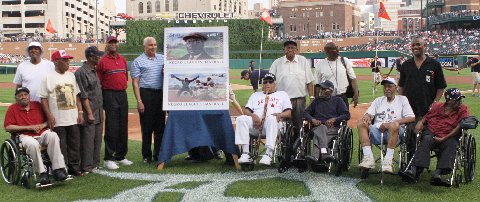
The color line in American baseball excluded players of African descent from organized baseball — the major leagues and affiliated minor leagues, until Jackie Robinson signed with the Brooklyn Dodgers organization for the 1946 season.
Racial segregation in professional baseball starting in the 1880s and is sometimes called a gentlemen’s agreement, meaning a tacit understanding, because there was no written policy at the highest level of baseball organization.
But as has been the history of Blacks in America, when one door closes, many times another is opened somewhere else. In the case of Black baseball players, entrepreneurial minded men and women looked at the situation that meant to denigrate them and made lemonade out of lemons.
They created their own leagues as far back as the late 1899s. But it was really during the 1920s to 1950s that the Negro Leagues took flight and became one of the biggest Black collective businesses in American history.
The leagues primarily featured those players barred from organized baseball – Black, Hispanic, some Native Americans, and even native Hawaiians played baseball during that period.
Detroit fielded a team called the Detroit Stars that uplifted and brought entertainment and joy to many in the Black community.
Long after Robinson and Larry Doby had integrated the National and American leagues, The Tigers, like Boston and a number of other cities, simply would not have Black players on their roster.
That is why it is especially pleasing that the Tigers have taken the front seat in acknowledging their history concerning the players they fought hard to exclude.
In 1995, the Tigers launched the annual Negro Leagues Tribute Game, the first of its kind in Major League Baseball. In 2003, the one-day event evolved into a three-day celebration now titled the Annual Negro Leagues Weekend. It was the first and now is the longest running three-day celebration in Major League Baseball.
“The Negro Leagues are an important part of the history of baseball and of America,” said Ellen Hill Zeringue, Tigers vice president of marketing. “These gentlemen were pioneers and their true love of the game transcended the racial barriers.
The former Negro League stars that appeared before the Tribute Game were: Frank Crosson, a pitcher for the Memphis Red Sox and Detroit Stars, 1954-56; Joe Douse, a pitcher for the Kansas City Monarchs, 1952-53; Melvin “Buck” Duncan, from 1949 to 1956, he pitched for the Kansas City Monarchs and the Detroit Stars; Harold “Bee-Bop” Gordon, a member of the Chicago American Giants, 1950-51, the Detroit Stars in 1954; Bill Hill, a member of the Kansas City Monarchs, 1955-56; Gene Johnson, played first and third base for the Detroit Stars, 1956-57; Cecil Kaiser, played for the Detroit Stars from 1939 to 1940, the Motor City Giants, 1941-44, the Pittsburgh Crawfords in 1946 and the Homestead Grays, 1947-49; Alton King, came to Detroit in 1942 and played with the Motor City Giants from 1942 to 1945 as their player/manager, also played for the Detroit Wolves, 1945-47; James “Bullet” Moore, played for the Detroit Stars, Motor City Giants and the Detroit Brown Bombers from 1939 to1945; Ron “Schoolboy” Teasley, a Detroit native who played for the Detroit Cubs, Toledo Cubs, Toledo Crawfords, Toledo Rays, Detroit Wolves and New York Cubans from 1939 to 1948.
The weekend has evolved into a special happening for many. There is a charity raffle; “Sing Stars” competition; Ndamukong Suh, the Detroit Lions 2010 No. 1 draft pick, threw out the ceremonial first pitch; there was the passing of the bat on-field, pregame ceremony; and more.
The Tigers may have been slow getting out the gate in the fight against segregation in baseball, but they have become No. 1 in recognizing past injustices and have put together a community outreach weekend and many in Major League Baseball are following suit.
Leland Stein can be reached at lelstein3@aol.com.